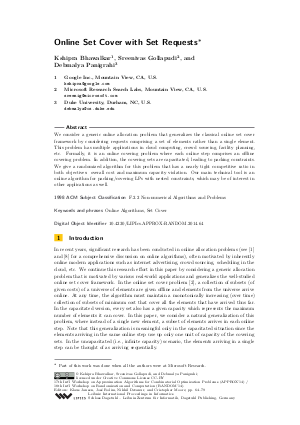Online Set Cover with Set Requests
Authors Kshipra Bhawalkar, Sreenivas Gollapudi, Debmalya Panigrahi
-
Part of:
Volume:
Approximation, Randomization, and Combinatorial Optimization. Algorithms and Techniques (APPROX/RANDOM 2014)
Part of: Series: Leibniz International Proceedings in Informatics (LIPIcs)
Part of: Conference: International Conference on Randomization and Computation (RANDOM)
Part of: Conference: International Conference on Approximation Algorithms for Combinatorial Optimization Problems (APPROX) - License:
 Creative Commons Attribution 3.0 Unported license
Creative Commons Attribution 3.0 Unported license
- Publication Date: 2014-09-04
File

PDF
LIPIcs.APPROX-RANDOM.2014.64.pdf
- Filesize: 0.51 MB
- 16 pages
Document Identifiers
Subject Classification
Keywords
- Online Algorithms
- Set Cover
Metrics
- Access Statistics
-
Total Accesses (updated on a weekly basis)
0PDF Downloads0Metadata Views
Abstract
We consider a generic online allocation problem that generalizes the classical online set cover framework by considering requests comprising a set of elements rather than a single element. This problem has multiple applications in cloud computing, crowd sourcing, facility planning, etc. Formally, it is an online covering problem where each online step comprises an offline covering problem. In addition, the covering sets are capacitated, leading to packing constraints. We give a randomized algorithm for this problem that has a nearly tight competitive ratio in both objectives: overall cost and maximum capacity violation. Our main technical tool is an online algorithm for packing/covering LPs with nested constraints, which may be of interest in other applications as well.
Cite As Get BibTex
Kshipra Bhawalkar, Sreenivas Gollapudi, and Debmalya Panigrahi. Online Set Cover with Set Requests. In Approximation, Randomization, and Combinatorial Optimization. Algorithms and Techniques (APPROX/RANDOM 2014). Leibniz International Proceedings in Informatics (LIPIcs), Volume 28, pp. 64-79, Schloss Dagstuhl – Leibniz-Zentrum für Informatik (2014)
https://doi.org/10.4230/LIPIcs.APPROX-RANDOM.2014.64
BibTex
@InProceedings{bhawalkar_et_al:LIPIcs.APPROX-RANDOM.2014.64,
author = {Bhawalkar, Kshipra and Gollapudi, Sreenivas and Panigrahi, Debmalya},
title = {{Online Set Cover with Set Requests}},
booktitle = {Approximation, Randomization, and Combinatorial Optimization. Algorithms and Techniques (APPROX/RANDOM 2014)},
pages = {64--79},
series = {Leibniz International Proceedings in Informatics (LIPIcs)},
ISBN = {978-3-939897-74-3},
ISSN = {1868-8969},
year = {2014},
volume = {28},
editor = {Jansen, Klaus and Rolim, Jos\'{e} and Devanur, Nikhil R. and Moore, Cristopher},
publisher = {Schloss Dagstuhl -- Leibniz-Zentrum f{\"u}r Informatik},
address = {Dagstuhl, Germany},
URL = {https://drops.dagstuhl.de/entities/document/10.4230/LIPIcs.APPROX-RANDOM.2014.64},
URN = {urn:nbn:de:0030-drops-46883},
doi = {10.4230/LIPIcs.APPROX-RANDOM.2014.64},
annote = {Keywords: Online Algorithms, Set Cover}
}
Author Details
References
-
Susanne Albers. Online algorithms: a survey. Math. Program., 97(1-2):3-26, 2003.

-
Noga Alon, Baruch Awerbuch, Yossi Azar, Niv Buchbinder, and Joseph Naor. The online set cover problem. SIAM J. Comput., 39(2):361-370, 2009.

-
James Aspnes, Yossi Azar, Amos Fiat, Serge A. Plotkin, and Orli Waarts. On-line routing of virtual circuits with applications to load balancing and machine scheduling. J. ACM, 44(3):486-504, 1997.

-
Yossi Azar. On-line load balancing. In Online Algorithms, pages 178-195, 1996.

-
Yossi Azar, Umang Bhaskar, Lisa K. Fleischer, and Debmalya Panigrahi. Online mixed packing and covering. In SODA, 2013.

-
Yossi Azar, Joseph Naor, and Raphael Rom. The competitiveness of on-line assignments. J. Algorithms, 18(2):221-237, 1995.

-
M. Balazinska, B. Howe, and D. Suciu. Data markets in the cloud: An opportunity for the database community. PVLDB, 4(12):1482-1485, 2011.

-
Allan Borodin and Ran El-Yaniv. Online Computation and Competitive Analysis. Cambridge University Press, New York, NY, USA, 1998.

-
Niv Buchbinder and Joseph Naor. The design of competitive online algorithms via a primal-dual approach. Foundations and Trends in Theoretical Computer Science, 3(2-3):93-263, 2009.

-
Anupam Gupta and Viswanath Nagarajan. Approximating sparse covering integer programs online. In ICALP (1), pages 436-448, 2012.

-
Kamal Jain and Vijay V. Vazirani. Approximation algorithms for metric facility location and k-median problems using the primal-dual schema and lagrangian relaxation. J. ACM, 48(2):274-296, 2001.

-
Simon Korman. On the use of randomization in the online set cover problem. M.S. thesis, Weizmann Institute of Science, 2005.

-
Paraschos Koutris, Prasang Upadhyaya, Magdalena Balazinska, Bill Howe, and Dan Suciu. Querymarket demonstration: Pricing for online data markets. PVLDB, 5(12):1962-1965, 2012.

-
Chao Li and Gerome Miklau. Pricing aggregate queries in a data marketplace. In WebDB, pages 19-24, 2012.

-
Rajeev Motwani and Prabhakar Raghavan. Randomized Algorithms. Cambridge University Press, 1997.

-
Prabhakar Raghavan and Clark D. Thompson. Randomized rounding: a technique for provably good algorithms and algorithmic proofs. Combinatorica, 7(4):365-374, 1987.

